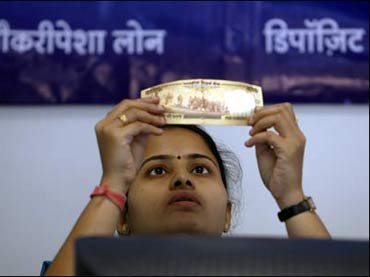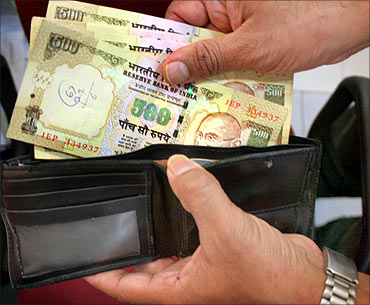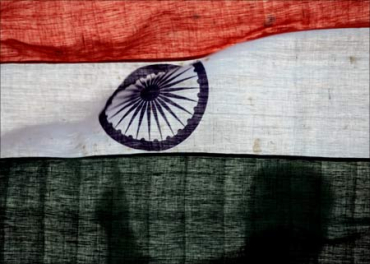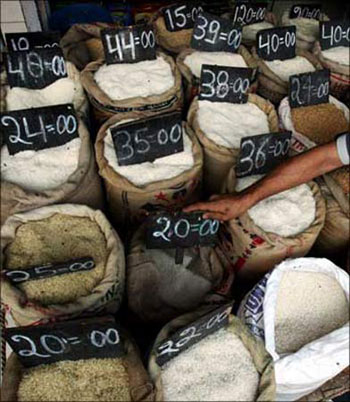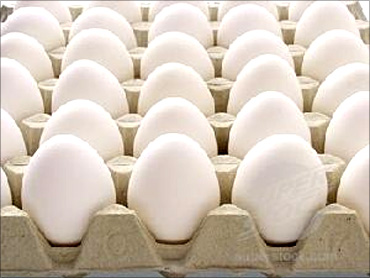 | « Back to article | Print this article |
Why is India's middle class silent on inflation?
Keeping inflation low and stable has been one of India's major policy successes. On the strength of this achievement, the Reserve Bank of India could pride itself as one of the better-run public institutions in the country.
But conducting monetary policy was among the easier jobs in India. In some ways, RBI had little choice but to deliver macroeconomic stability because of the propitious political economy of inflation.
The politically assertive middle class has had low inflation tolerance, with five per cent considered the threshold - or Lakshman rekha - beyond which the clamour for action, never constrained by apathy or acquiescence, becomes difficult to ignore.
Click NEXT to read more...
Why is India's middle class silent on inflation?
In this light, the mystery, or rather the greater mystery, in the latest episode of inflation is not why RBI has been less than forceful in getting inflation under five per cent.
Rather, it is why the public has not created a political furore over the issue: call it the mystery of citizens not barking in daylight.
And the puzzle has only deepened because inflation has exceeded five per cent by a substantial margin and for a considerable period of time (19 months and counting) as Jahangir Aziz of JPMorgan has pointed out in an excellent recent analysis.
Click NEXT to read more...
Why is India's middle class silent on inflation?
Consider a number of possible hypotheses/explanations and the objections to them.
(i) Protection of rural India: given that food inflation has remained relatively elevated, clamour for action from the poor, especially in rural India, should have been considerable.
But the National Rural Employment Guarantee Scheme, especially now with wages indexed to inflation, has served to cushion the poor from the worst consequences of inflation.
The problem with this hypothesis is that the politically voluble constituency on inflation has tended to be the salaried, urban middle class.
Click NEXT to read more...
Why is India's middle class silent on inflation?
(ii) Declining importance of food: perhaps consumers are less exercised because even though food price inflation has surged, food now constitutes a declining portion of consumer expenditure.
According to the national income accounts, the share of food in private consumption expenditure declined from 41 per cent to 29 per cent over the 2000s. The consumer is less hurt, hence less voluble.
The problem with this explanation is that what began as high food inflation has now become high overall inflation.
The entire consumption basket has become dearer to buy.
Click NEXT to read more...
Why is India's middle class silent on inflation?
So, even those people whose wages are linked to inflation will be vulnerable to inflation. But in the short run, inflation adversely affects those the most whose incomes are fixed and less linked to inflation.
Public-sector employees, who have traditionally been most vociferously opposed to inflation, have typically fallen in this category.
A corollary is that as the size of government has shrunk relative to the dynamic private sector so has the constituency against inflation.
Click NEXT to read more...
Why is India's middle class silent on inflation?
For this argument to be valid, though, remuneration in the private sector would have to be more closely linked to inflation than it is in the public sector.
(iv) Rise of debt-financed consumerism: one of the striking changes in the Indian economy over the last decade has been the rise of consumption, particularly credit-financed consumption, especially of the urban middle class.
For example, according to RBI data, personal consumer loans increased roughly threefold during the 2000s from three per cent of GDP to about 10 per cent.
Click NEXT to read more...
Why is India's middle class silent on inflation?
However, this argument is valid only if borrowing is at fixed rather than floating interest rates, and consumer loans in India tend to be of the latter type.
(v) The absence of large price changes: another possibility that the behavioural economists might emphasise relates to the magnitude of price changes.
It is possible that any given overall inflation rate will elicit greater notice if it comprises large changes in a few prices than smaller changes across the board.
Indeed, even in the early phase of this episode of high inflation, sharp rises in the price of vegetables, sometimes exceeding 50 per cent, did create a consumer backlash.
Click NEXT to read more...
Why is India's middle class silent on inflation?
But why might this explanation carry more salience now?
In the days of the Hindu rate of growth, there may simply not have been enough faith that the economy or policy makers could credibly create growth opportunities for a broad cross-section.
The record of success may have changed that dim view. The flip side of voters expecting, and even feeling entitled to, such opportunities is the fear that policy makers can take them away through anti-inflation efforts in a way that they could not have done in the past.
Click NEXT to read more...
Why is India's middle class silent on inflation?
There might, of course, be an even simpler psychological explanation for the lack of uproar against higher inflation.
Pernicious as high inflation is, citizens today might consider that more egregious sins of corruption and venality are being perpetrated on them.
If the stock of consumer outrage is limited, inflation's claims to that outrage may have been crowded out.
Click NEXT to read more...
Why is India's middle class silent on inflation?
In any event, since higher inflation tolerance is still just a possibility, its causes unclear, and its reversal not improbable (as in 2008), RBI should not relax its guard.
And the government should help with some serious fiscal consolidation on its part.
The Sita of macroeconomic stability should not be sacrificed by diluting the Lakshman rekha of five per cent inflation.
The author is senior fellow, Peterson Institute for International Economics and Centre for Global Development
His book, Eclipse: Living in the Shadow of China's Economic Dominance, will be published this fall





